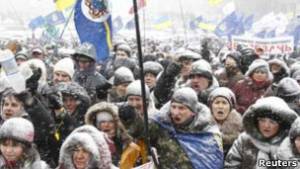• Topics / Freedom of peaceful assembly
• Topics / Social and economic rights
Tax Code Protests and Prosecution of Peaceful Protesters
The BBC Ukrainian Service devotes a report to the first anniversary of the protests against the draft Tax Code in autumn 2010. The mass protests became known as the Tax Code Maidan because of the huge numbers of protesters and tents on Maidan Nezalezhnosti [Independence Square] and the associations with the mass protests against vote rigging known as the Orange Revolution.
The Tax Code passed in autumn, the BBC writes, led to the first mass protests since Viktor Yanukovych was elected President in February 2010.
The BBC speaks to a small business owner who says that he was forced to sack several members of staff and switch into “survival mode”. The fact that people like him prefer not to be named is given by the author, Anastasya Zanuda, as the first change since the Tax Code Maidan. There are other business owners, also not wishing to be recorded, who explain that over the year since the new Tax Code came into force, they have more than once thought about closing their business. Yet since the procedure for closure is perhaps harder than starting a new one up, many have been forced to de jure remain in business, while de facto not paying taxes.
The State Tax Administration, on the other hand, asserts that the new Tax Code has not had an impact on the number of individual small business owners. The Head of the STA, Oleksandr Klymenko denies that there has been any reduction in the number of small-scale business owners.
The author speaks to various politicians from the ruling majority and the opposition who, not unexpectedly, have different views as to the results of the moves.
From the report by the BBC Ukrainian Service
Criminal prosecution of Tax Code Protesters
The tents on Maidan Nezalezhnosti were there for two weeks. Then, almost immediately following the adoption by parliament of a Tax Code which apparently made some concessions, the municipal services and police moved in at 4 a.m. and in less than an hour surrounded the protesters and dismantled their tents. A police spokesman said that the tents had been removed in accordance with a court ruling.
Most worrying were the criminal investigations which followed.
Serhiy Kostakov was arrested at the beginning of December and held in custody for seven and a half months, before finally being released in July on a signed undertaking not to leave the city. The period of detention was probably longer than he would receive if convicted. He is accused of blocking the road and damaging a car during the protest in the centre of Kyiv. He asserts that on the contrary, he called on the protesters not to touch the cars. His words are confirmed by the police recording. He says that it is clear from the video that others were hitting the car.
The “granite slab case”
The other criminal investigations were a first for Ukraine, where tent camps have been a common form of protest, used also by those now in power.
Nine men, some of whom were not even involved in the Tax Code protests were charged with allegedly damaging the granite stone on Maidan Nezalezhnosti by using metal pikes for erecting the tents.
Lawyer from the Ukrainian Helsinki Human Rights Union who is defending some of the accused, Oleh Levytsky has called this case unique in his legal practice. “For the first time in our history the regime has found a collection of down-and-outs and people who wanted to earn a few kopecks by holding a banner and has accused them of damaging granite covering. This is after the Party of the Regions itself in 2008 erected tents on Maidan, a fair number, if not the most in Maidan’s history, which can even be seen on photographs from the party’s official website.”
Oleh Levytsky added that this was the first time in independent Ukraine’s legal practice that people are facing criminal prosecution for exercising their constitutional right to peaceful assembly
He succeeded in getting his clients released finally from custody, however the criminal charges remain. There was also a worrying development in October when Vasyl Gruzynov, who was on the wanted list in connection with the same charges, was taken into custody. He was held in custody for a week and it seemed probable that he would be remanded in custody, however on 20 October he was released by the Holosiyivsky District Court in Kyiv on a signed undertaking not to leave.
In early November, Serhiy Kostakov complained that he, his wife and neighbours were aware of athletic looking young men taking turns to watch their building. Fearing deliberate provocation, he made a statement with the Prosecutor and police asking them to ascertain who was following him, and giving grounds for believing that the law enforcement bodies were carrying out certain investigative operations.
Photos from the BBC Ukrainian Service






